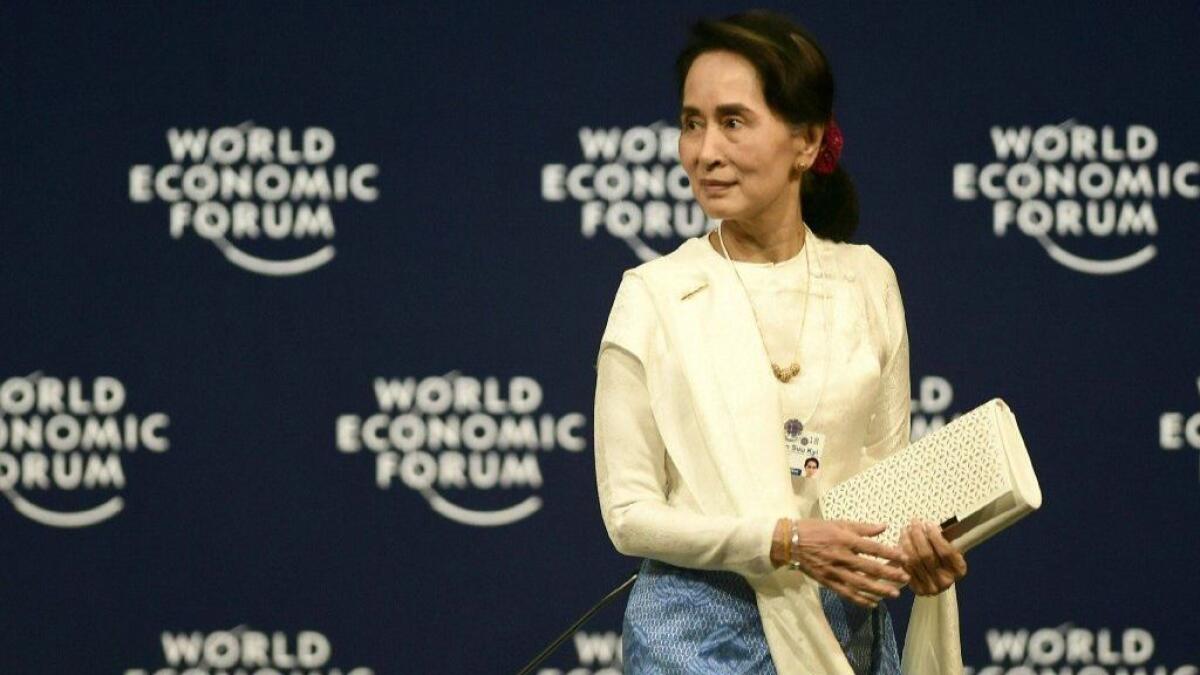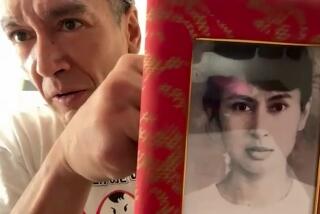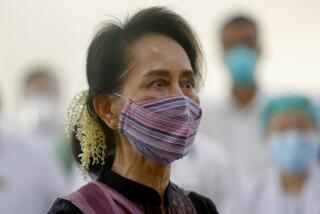Aung San Suu Kyi defends jailing of journalists in Myanmar: ‘They have every right to appeal’

Reporting from Mumbai, India — Myanmar leader Aung San Suu Kyi on Thursday defended the imprisonment of two Reuters journalists who were investigating military attacks against Rohingya Muslims, saying the men were not punished for their reporting but because they broke the law.
“If we believe in the rule of law, they have every right to appeal the judgment and to point out why the judgment was wrong, if they consider it wrong,” Suu Kyi told an audience at a World Economic Forum gathering in Vietnam.
The Nobel Peace Prize laureate broke her silence in the closely watched case, which world leaders and human rights groups have described as an assault on freedom of expression and a further sign of declining democratic practices in a country emerging from half a century of military rule.
Suu Kyi’s comments drew harsh criticism from human rights groups that argue she has been complicit in the military’s bloody, scorched-earth operations against the Rohingya people, more than 700,000 of whom have fled across the border into Bangladesh since August 2017.
The former democracy icon — who led the struggle against military rule in the country also known as Burma — has declined to criticize the army, which retains immense constitutional powers despite her party winning national elections in 2015.
Asked about the violence against the Rohingya, which some critics have compared to a genocide, Suu Kyi said that “the situation could have been handled better” but that the military had acted “for the sake of long-term stability and security.”
The reporters with the Reuters news service — Myanmar nationals Wa Lone and Kyaw Soe Oo — were looking into an alleged massacre by Myanmar security forces in western Myanmar’s Rakhine state last year. The two found evidence that Myanmar soldiers and Buddhist villagers killed 10 Rohingya men execution-style and buried them in a mass grave in the village of Inn Din.
The journalists say they were set up by police officers who arranged a meeting to hand over official documents, then arrested them for violating the colonial-era Official Secrets Act.
The journalists pleaded not guilty but were convicted and sentenced last week to seven years in jail. Their lawyers have said they will appeal the judgment.
The comments by Suu Kyi, who holds the position of state counselor, indicated that she was unlikely to push for the reporters to be pardoned by Myanmar President Win Myint, a close ally.
“That’s really unfortunate because every single day behind bars is too many for these reporters, who never should have been imprisoned in the first place,” said Phil Robertson, deputy Asia director for Human Rights Watch.
“Suu Kyi is doubling down on her ‘rule of law’ mantra while ignoring that these journalists would likely have been acquitted in a court not so totally beholden to the military and government.”
Last week, Vice President Mike Pence joined the chorus of world leaders who have called for the journalists’ release.
Suu Kyi rejected the criticism, saying there had been no “miscarriage of justice.”
“They were not jailed because they were journalists,” Suu Kyi said. “They were jailed because the sentence has been passed on them.”
Shashank Bengali is South Asia correspondent for The Times. Follow him on Twitter at @SBengali
UPDATES:
12 p.m.: This article was updated with a comment from Human Rights Watch.
This article was originally published at 12:50 a.m.
More to Read
Sign up for Essential California
The most important California stories and recommendations in your inbox every morning.
You may occasionally receive promotional content from the Los Angeles Times.











